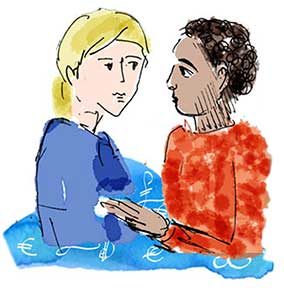
Albert Einstein’s famous statement “Not everything that counts can be counted and not everything that can be counted counts” suggests that there are many forms of value in human endeavor and that it really matters to understand ‘what counts’. The conviction that it is essential to understand better what counts in partnerships and other collaborative approaches to sustainable development underpins, informs and drives our Working with Donors project.
The Working with Donors project is about understanding better how those providing money (donors, funders) can and do affect the impact and performance of multi-sector partnerships.
Money plays a critical role in advancing partnership practice for greater effectiveness and impact. But the key lesson from partnering practice is that although money is essential, other types of resources are no less critical. Money can help build stronger partnerships and more effective partnering processes but it can also stifle the innovation and transformation so urgently needed.
Key activities
Working with donors provides a framework for engaging with individual donors and also with alliances or consortia of donors, as well as those working with donors in a variety of ways. Activities which we are enabling and promoting through Working with Donors include the following:
- ADVOCACY to increase the awareness of donors as to how they affect (positively & negatively) the performance and impact of multi-stakeholder partnerships with which they are involved through sharing results of action research, targetting media campaigns, show-casing good practice, awards & challenge programmes
- ACTION RESEARCH to understand better the barriers and opportunities faced by donors seeking to increase their effectiveness and contributions as a) providers of money – ie. strategies, good practices for designing & delivering finance; b) partners in multi-stakeholder partnerships; c) working with other donors
- SUPPORT APPROACHES for increasing the partnering capacities, skills & capabilities of those operating as ‘internal partnership brokers’ within donor organisations (essentially offering to accompany them on their partnership brokering journey)
- SERVICE PROVISION helping donors become more effective partners in their operations, through training, review/evaluation, case studies, learning workshops/events and co-creating / animating initiatives and programmes
Partnering challenges
Donor interventions in partnering processes are linked to partnering challenges that must be dealt with by many of those who are participating. These include:
- Lack of internal alignment within partner organisations
- Lack of coherence of approach between partners
- Inter-sector unhelpful assumptions (about each other)
- Intra-sector competition (especially for funds)
- Paper partnerships (thrown together just to access funds)
- Wearing two hats (eg being both partners and donors)
- Failure to build on diversity and genuinely innovate
- Unwillingness to let go of a level of sole control
- Failure to value / leverage non-financial contributions
- Held back by a disabling external partnering environment
Outcomes
We anticipate a range of outcomes including:
- Participating donors become more effective partners in the multi-stakeholder partnerships in which they participate
- Increased investment in building partnering capability/capacity in donor funding
- More donors focus more deliberately on the ‘partnering’ dimension in their programmes.
- More effective donor partnerships in terms of engagement & impact
- Stronger and more genuinely collaborative relationships between donors and grant recipients in which power is shared
